Is there a perfect time to read a given book? A moment not too early or too late, where you’re not too young or too grown—not to mention not too tired, worn out, beaten down by the world, or too excitable and distracted and enthused about other things? What about a perfect place?
The experience of reading a book at what feels like precisely the right time and in just the right place can probably be had deliberately, but as often as not is a matter of chance. I read Ursula K. Le Guin’s Lavinia on a train, on deadline for a review, before trains had wifi. In my memory it was a gloomy day, so there was nothing, not even scenery, to distract me. The rhythm of the train propelled my reading, but also connected with it, so that I always think of that book with movement and focus.
That was an unexpected blessing of place. But when I think of the ideal window of reading opportunity, I mostly think of time, which is another way of saying context: How much have you lived? What are you bringing to the book, and what is it bringing fresh to you? Where are you meeting each other, in the stages of your relative existence?
For some books and readers, this window never closes. But for others, it sure feels like it does.
As a teen, I did very little other than read. (Rural Oregon offered few options.) I read great books, mediocre books, books I didn’t fully understand, books I wanted to understand, books I brought home from the mall bookstore and books my mother had bought decades earlier. Going back to some of those books is a well of surprises: I remembered nothing of the plot of Elizabeth A. Lynn’s The Sardonyx Net, only that I had been so upset by the scene in which a girl burns to death that I am, to this day, excessively afraid of fire. I loved Kathleen Sky’s Witchdame so deeply, for its mopey dragon and determined but not particularly special princess, yet I also totally missed some wild details of the ritual of that princess’s coronation. As a kid, Patricia A. McKillip’s The Forgotten Beasts of Eld just read like a dream—I too wanted to live in the woods with a host of magical creatures and piles of books. But re-reading it as an adult, I saw another side, a story about compromise and freedom.
These were entirely different books when I reread them years later. What I saw and what I didn’t notice was entirely different from book to book, and sometimes unpredictable. Maybe I read those books “too early,” in that I didn’t understand parts of them, but if I hadn’t, then I wouldn’t have the specific experience of rereading them, decades later, and finding so much more. You never read the same book twice—but you also can’t have the specific pleasure of rereading without enough time and distance to ensure the experience is something new.
But some of the novels I loved in that era, I’ve never wanted to go back to. It feels like the window is closed, or at least closing. Can anyone read Tom Robbins’ Still Life With Woodpecker the way an oblivious 16-year-old, hungry for all the peculiar experiences of the world, can read it? If I go back to the very first Heralds of Valdemar books, will I change the way I felt about them as a horse-mad, lonely kid? Is that window closed?
If a window really closes, the trick is not to let it change what a book was to you. If you loved a book once, because of the person you were and the book it was, it’s important to respect that, to accept that your younger self didn’t know about an author’s hateful views or their dark personal history. It used to be common to read from a place of ignorance when it came to the writers behind the work. All we knew was whatever the back cover told us. Now that we know so much more—now that authors have to have personal brands, Twitter presences, personal essays about their own favorite books—it changes the context. But what you got from those books, you still got. Those reading experiences are still yours. Knowledge can change what you bring to a book now, but not how you read it the first time.
The window can narrow in other ways, too, ways that are not specific to a book, but to what you’ve been reading. Sometimes I think I can’t take another fantasy about the Most Special Person, the only one who can save the world, especially if they are royalty or have a magic power no one else has. I’ve been reading these stories for as long as I can remember, but they rarely work the same magic they used to. It’s like I’ve met my personal quota on that front, and need to take a break until I’ve read an equal number of other kinds of stories: stories about communities working together; stories about smaller, more personal stakes; stories about how people make their fates, free of destiny and prophecy.
(But books about those Most Special Ones will still sneak in and surprise me.)
The right place to read a book is both simpler and more elusive. It can be anywhere: a favorite chair, a favorite coffeeshop, a long flight. (I read Chuck Wendig’s Wanderers on a plane, which kind of felt like a mistake—it elevated the stress!—but it was so propulsive I simply couldn’t make myself stop.) When you’re a kid, where you read is entirely determined by your parents: maybe it’s in bed, maybe it’s in the book-lined hallway of a boring party attended only by boring grownups.
Mostly, it doesn’t matter. You fall into the book and you’re there, not here. But there are books that want to be read outside (Pilgrim at Tinker Creek, How to Do Nothing); books that want to be read at night (I like to read Expanse books when it’s dark out and I can see the night sky); books for road trips and books for vacations and books for reading in little snippets on your lunch break rather than in big gulps. Some books want to be read when you’re alone, and with others it’s almost necessary to have company. At seventeen, I read Jurassic Park in one long sitting in the corner of a beloved cafe. I can’t say I necessarily recommend this—but I also can’t pass that corner without remembering the delight of just not stopping, getting refill after refill, turning page after page, pausing to look up only when trains rattled past on the nearby track.
Buy the Book
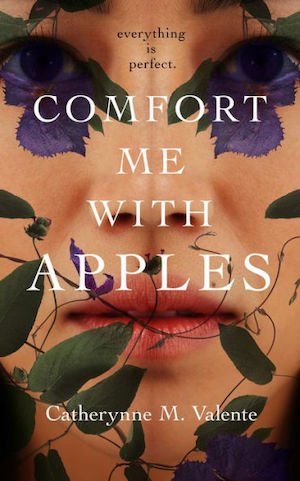

Comfort Me With Apples
Reading a book in the city where it’s set is one particular joy; reading in contrast is another. I re-read American Gods while traveling in Australia, thinking about what a strange country I’d left behind. It felt different, there. I read Haruki Murakami’s The Wind-Up Bird Chronicle on that same trip, in tiny stolen moments, and I still think of it in fits and starts, a book made up entirely of flashes of story and image (and cats, and wells). But this kind of reading-in-place is a privilege, depends on your location, and feels like something of a different era, right now. Now I’m more likely to pick a book in hopes the book will transport me to a different place on its own—a planet of the Culture, maybe. A great city watched over by an N.K. Jemisin character.
Now, finding the ideal reading window is a matter of balancing so many more elements. Do you want to know the author’s life story, to read intense Q&As and their thoughts on craft? Do you want to go in as blank as possible, intrigued by a plot summary and avoiding anything else that might cross your screen? Is it even possible to be aware of hype without being affected by it?
For some, that perfect window is simply as early as possible, before anyone else’s opinion has a chance to color your own. And there is joy in the early read, in being able to tell your reading friends that yes, that book is just as good as promised, or warn them about some detail that may make it a bumpy read for them. For others, it’s armed with as much knowledge as possible about the book, its creation, its inspiration, the playlist the author had on while writing. For others, none of that even registers. The book is what’s on the page, nothing more. (I want to know what it’s like inside their heads.)
This isn’t just about how there’s no perfect time to read a book, no spell to get it just right, no process to hone. It’s also about how you change the book, the way you might think more about the mentor characters than the sprightly heroines as you get older, or how you’ll see the way an author worked in climate change where you never saw it before. The books we read when we were young have all kinds of new things to offer; the ones we read now will too, decades on. The best books keep the window open for you.
Molly Templeton lives and writes in Oregon, and spends as much time as possible in the woods. Sometimes she talks about books on Twitter.










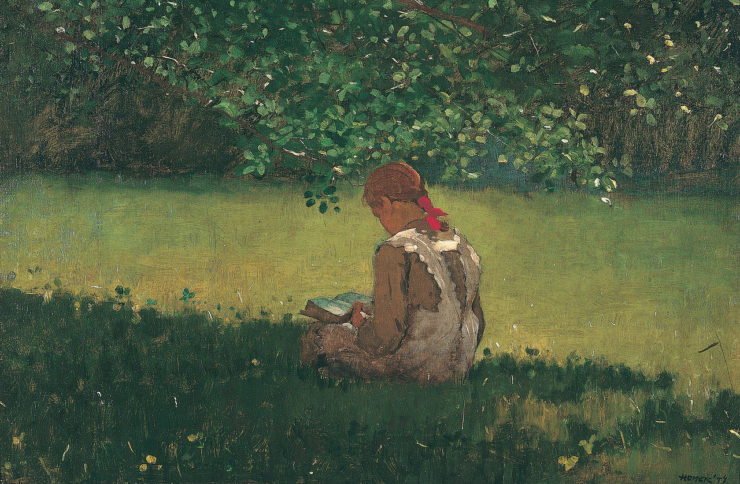
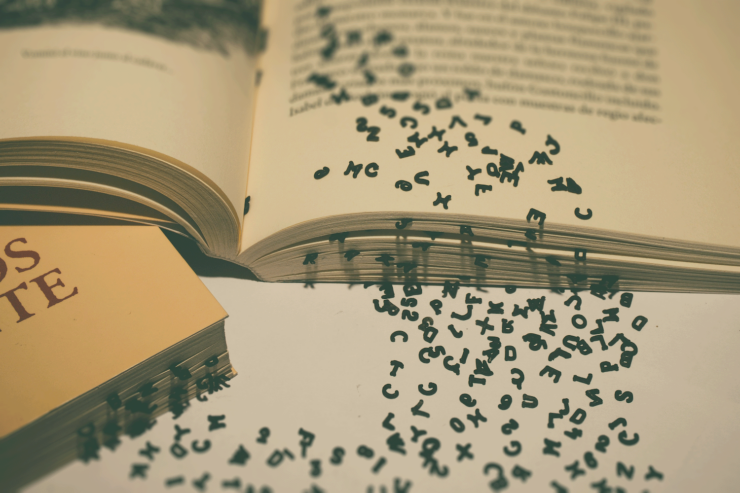
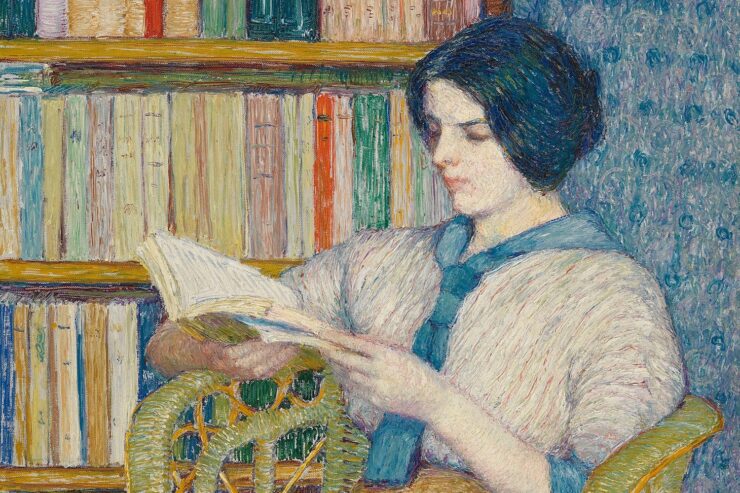
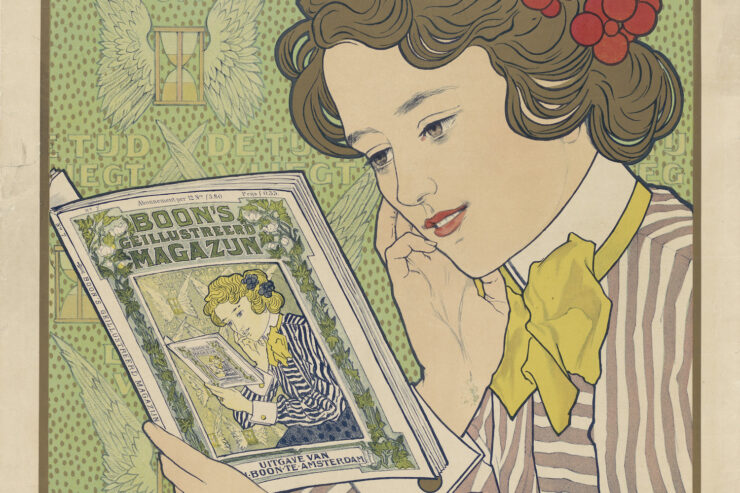
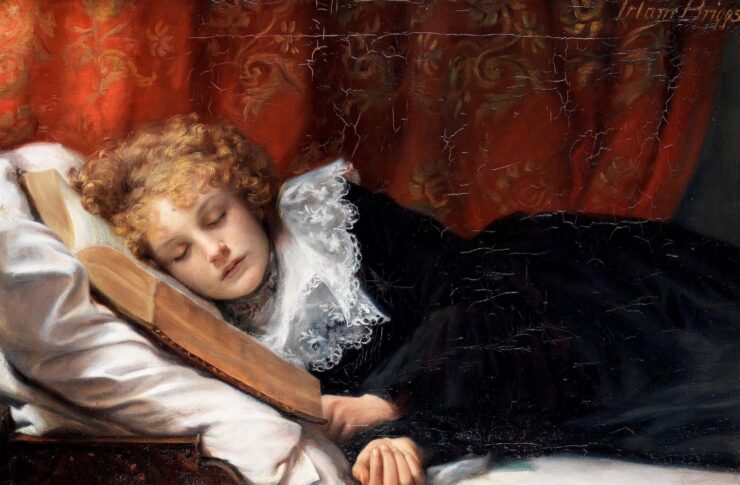
As a kid, Patricia A. McKillip’s The Forgotten Beasts of Eld just read like a dream—I too wanted to live in the woods with a host of magical creatures and piles of books.
Oh, yes! Me too! And a crystal done! I wanted a crystal dome!
At one point in my college years, I was reading (or probably re-reading) Winter’s Tale by Mark Helprin. Yes, the one the movie is based on. Trust me, the book is better. It’s such a rush of language and beautiful metaphors and turns of phrase.
On a road trip to Las Vegas for a convention, I was reading this book in the car, and feeling the rush of motion of the car itself alongside the rush of reading the book. I even later wrote a LiveJournal post about the feeling (yes, it was that long ago).
So not a specifically perfect time of life to read a book, but a specific situation at least!
Heinlein is great when you’re ~12-22 years old and virtually unreadable after that.
If you didn’t read *Preacher* by 2010 or so, you likely won’t enjoy it nearly as much as those of us who did. Hell, I don’t enjoy it nearly as much, and I actually own a Zippo with “Fuck Communism” engraved on it.
However, I’m pretty sure I have the absolute winner of this category: Sarah Pinsker’s A Song For A New Day, I actually discovered by reading the linked review from this very site, thought it sounded cool, and grabbed a copy from the library. That was in October of 2019. The book is about a very near future in which a combination of terrorism and a global pandemic has forced all social interaction, school, work, concerts, etc. entirely online. Turns out that future was way closer than anyone expected, and anyone who didn’t read it by Christmas of 2019 or so will absolutely never experience it in the same way. Hell, I re-read it a few months ago and just had to stop and walk away multiple times because of how uncannily it resembled real life.
Good news though, her second novel, published a few months ago, is about brain implants exacerbating inequality, discrimination, mental illness, and other social issues, so at least we know what the giant problem facing us in 2022 is going to be because Ms. Pinsker is obviously a damned time traveler.
One can’t know in advance what the perfect time will be; one can only read, and re-read if the flood of other interesting works leaves time (a problem I certainly didn’t have when I started reading) — and ask why the reread is different (if it is).
Sometimes one just misses a key detail; I read Lucky Jim at age 18 and didn’t even notice that the author tossing off on page 1 that every time Jim opens his mouth he makes it clear he’s Not Our Kind (for values of “Our” restricted to traditional English academia). And there’s a scene involving madrigal singing that I found out several years later was a direct mirror of an ~Elizabethan autobiography with the same NOK import.
Sometimes the naive reading is better; I don’t know how I would have reacted to The Lion, the Witch, and the Wardrobe if I’d been much older than 8 — when I missed the the presentation of broad-based mythos as if it were unique to Christianity (not to mention the smugness about English virtues). OTOH, even if I’d been an adult in 1961 I might have read them differently before The Prisoner and Le Carré knocked over our ideas about Good Us and Bad Them; a lot of SFF is visibly in conversation with some part of what’s come before, but books interact in our heads even when they were written in separate compartments.
books for reading in little snippets on your lunch break rather than in big gulps. I can’t do snippets with any book — I lose track of too many points. (I’ve read people saying they can read >1 novel at a time; I don’t know how they do this.) There was even a time when I’d pick an evening’s reading according to whether I could finish it before falling asleep. But there have been I-can’t-cope-with-this-right-now books — sometimes I get back to them, sometimes not.
Anne Rice’s Queen of the Damned as a 15yr old girl. He was practically talking to me!
Enders Game on a trip with my family listening to Red Hot Chili Peppers By The Way album on repeat. It was just perfect confined, uncomfortable feeling mixed with inertia.
When it comes to older books though I hit a bad patch of baby brain and needed to be able to read something comforting to me but also aloud on command and I ended up reaching for my Mercedes Lackey and Diana Wynne Jones. I had a ball trying to do accents. Particularly Howls! What I had forgotten was how much trauma is in the Valdemar books!
I was 18y/o in 1969 when I discovered Harlan Ellison. It was the perfect age & time to appreciate his level of intensity.
Now, I want to say “just calm down, dude.”
I read The Eye of the World for the first time on the way to my mother’s funeral 13 years ago. (It was a 6-hour drive. Later WoT books wouldn’t have worked in that span, but that one did.) That experience is intimately connected to the entire way I read the WoT series. I wonder sometimes how I would have felt reading them when they first came out. I only had that experience with the last 3 that Sanderson finished.
That Song for a New Day review is absolutely trippy now and I don’t think I could bring myself to ever read the book!
I was in 3rd grade when I was introduced to Narnia. I think I recognized the allegory, but didn’t mind it. Right after that I read The Hobbit. And moved on from there to Lord of the Rings. It was years, maybe decades, before I was old enough with enough experience to really appreciate all of LoTR, though I loved it from the beginning and reread it so many times that my parents got me The Silmarillion for Christmas (I was 12) when it was released. A first edition! Still have it! But it’s been reread so many times that the dust jacket is long gone. Around that time a librarian recommended John Gardner’s Grendel. Which I, at that age, thought was OK. It was several years before I was old enough to understand what it was really about, and to realize that I didn’t actually like it.
Not sure what the first SF book I read was. Probably started with short story collections. But I read Dune in 6th grade. And also The Forgotten Beasts of Eld.
So many books I read when I was maybe 11 to 13 and wasn’t old enough to really appreciate, or even understand, them.
@5: music accompanying SFF probably needs its own column, but I’ll suggest one less-confined combination: More Than Human while listening to Jefferson Airplane (specifically After Bathing at Baxter’s, when IMO they peaked.)
I read Stephen King’s It while working lonely graveyard shifts in a 60s era steam plant. A terrifyingly perfect time and location.
I’m retired so I have plenty of time for distraction free reading. But, beyond that, I let the books
come at me at random.
I generally read two books at a time, one serious and one more lighthearted. These days I prefer library ebooks so I put them on hold and wait for them to become available.
I prefer the surprise of a book to trying to find a perfect time and place to read it.
The idea that every aspect of your life up to the point that you read a book, including the setting and headspace your are in at the moment you readi it, impacts what you get from it, but that over time and space, your experience, potential or actual, changes in undeterminable ways.
I was a teenager. Alone in the house. The night sky was full of gently falling snow. I was reading Stardock for the first time.
It was just right setting for Fafhrd and the Gray Mouser. They were climbing a mountain in the snow.
@12 and @13, you remind me of the marvelous description Lois McMaster Bujold gave of reading The Two Towers for the first time:
“I don’t remember the names of most of my high school teachers, mind you, but I can still remember where I was sitting when I first opened up The Two Towers and read, with a pounding heart, “Aragorn sped on up the hill . . .” My father’s home office, the air faintly acrid with the scent of his pipe tobacco, in the big black chair under the window, yellow late-afternoon winter light shining in through the shredding silver-gray clouds beyond the chill bare Ohio woods to the west. Now, that’s imprinting. The chair, the room, the man, the world are all gone now. I still have the book. It has stitched itself like a thread through my life from that day to this, read variously, with different perceptions at different ages; today, my overtrained eye even proofreads as it travels over the lines, and sometimes stops to rearrange a sentence or quibble with a word choice. Is it a perfect book? No, doubtless not. No human thing is. Is it a great book? It is in my heart; it binds time for me, and binds the wounds of time.”